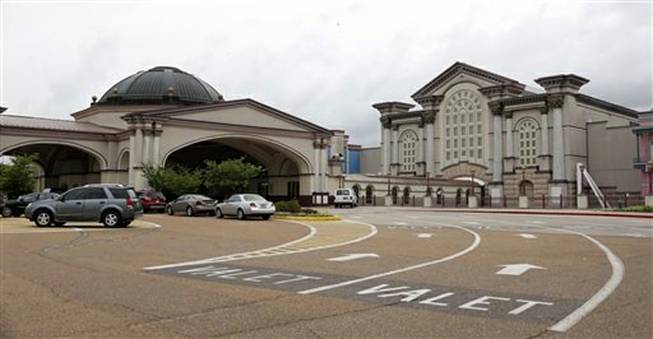
Rogelio V. Solis / AP
Valet lanes are empty at Harrah’s Tunica casino in Robinsonville, Miss. On June 2, Caesars Entertainment Corp., owners of the gaming facility, closed the doors on Harrah’s Tunica. The closure affects a work force of about 1,300 and involves several hotels, a golf course, a convention center and the casino.
Wednesday, June 18, 2014 | 1:57 p.m.
TUNICA RESORTS, Miss. — It was 3:30 p.m. on a Monday in May at Harrah's Tunica Hotel & Casino in northwestern Mississippi.
Gamblers were few in number, and dealers stood ready at idle card tables.
It was easy to see why Caesars Entertainment Corp. was giving up on the 136,000 square-foot casino floor — the largest between New Jersey and Las Vegas. Harrah's closed June 2 — 18 years after it first opened as the Grand Casino.
The Tunica Miracle — as boosters called the coming of gambling to what had been an isolated, economically moribund slice of the Mississippi Delta — is over. A boom that peaked with 13,000 jobs has slid into a struggle for survival.
The first casino opened on a riverboat docked at a remote river landing in 1992. With people lining up, more casinos came, building glitzy resorts in Tunica County's northern end, as close to Memphis, Tenn., as possible. In the first full year after Harrah's began operation, casinos in Tunica County won $776 million from gamblers. The peak came in 2006, when revenue reached almost $1.2 billion.
But increased competition and a recession that drained patrons' pocketbooks began to bite. In 2013, Tunica's casinos took in about $700 million.
Employment has been more than halved since its peak in 2001, when Tunica County counted 13,000 workers in the gambling industry. After the last gambler left the purple-pattern carpet on the Harrah's barge, so did about 1,000 jobs, dropping Tunica's total to about 6,000.
Sabrina Johnson was a cook at Harrah's for 16 years. She said she survived multiple rounds of layoffs but saw her hours shrink to less than 40 a week.
The 45-year-old Coahoma County resident is now looking for a new job but says full-time options are scarce in Tunica and her home county, and she doubts she can equal the $13.80 an hour she was making at Harrah's.
"I've still got to have some kind of income coming in," Johnson said. "The bills aren't going to stop."
Casino owners and analysts are drawing parallels with New Jersey's struggling casino center.
"Tunica looks and feels a lot like a market like Atlantic City," said R. Scott Barber, Caesars regional president.
Caesars, facing $23.6 billion in debt, said it wasn't making enough money to run the sprawling 2,200-acre Harrah's campus. It included more than 1,200 hotel rooms in three buildings, a golf course, a shooting range, an RV park and a kids arcade, knit together by a 24-hour bus system that connected Harrah's with Caesars' two other nearby casinos in Tunica County. Those properties — the Horseshoe Casino and Hotel and the Tunica Roadhouse Casino with their 1,800 jobs — stayed open. Caesars is investing $10 million in the renovation of the Horseshoe.
"We feel good about where we are," Barber said. "We feel bad about the ultimate outcome, but it's a good business decision for the long-term future of the company."
But Harrah's folding will make it harder for the Tunica community. Harrah's has the largest convention facility in the market. Its closing will cut advertising revenue for the Tunica Convention & Visitors Bureau and local government will have less revenue to take care of the extensive infrastructure it built — including an airport, a fire department, and a public recreation center — when revenues surged with gambling.
Gambling tax revenue collected by Tunica County has already fallen from $47.3 million in 2006 to $28.3 million in 2013.
Leaders of other casinos aren't sure if the decline will stop before more gambling halls close.
"Tunica, as a market, I don't know if we've seen the bottom," said Niklas Rytterstrom, the general manager of the Gold Strike, owned by MGM Resorts International, one of the market's strongest players.
That's in contrast to Mississippi's Gulf Coast casino market, where declines have been shallower and casinos have actually been winning more from gamblers in recent months. That market, traditionally smaller than Tunica, is likely to see revenues surpass its northern neighbor with Harrah's closure.
In the early days of Mississippi gambling, there was little competition, with patrons trekking from Oklahoma, Missouri and elsewhere. But those and many other states have casinos now. In recent years, competition has gotten even closer to home, with Southland Park Gaming and Racing in West Memphis, Ark., luring many traditional Tunica patrons. Southland won $142 million from gamblers last year, more than an average Tunica casino.
The recession has hurt, too. The number of casino visitors has fallen by two thirds since 2007. The number of visits from Mississippi patrons is down almost as steeply.
Caesars has been trying to sell Harrah's for three years, and Barber said the company could split the property, allowing a buyer to purchase only the casino and hotel tower on the Mississippi River side of the levee. Of the remaining eight casinos, three have been seized by lenders and are for sale — Resorts Tunica Casino, Bally's Casino Tunica and The Fitz Casino & Hotel.
Webster Franklin of the Tunica Convention & Visitors Bureau preaches the need for Tunica to diversify tourism offerings. A 2011 study suggested attractions such as a water park, a family entertainment center, and a museum such as Ripley's Believe It or Not.
"We have one industry," Franklin said. "We need help to develop it.”

Join the Discussion:
Check this out for a full explanation of our conversion to the LiveFyre commenting system and instructions on how to sign up for an account.
Full comments policy